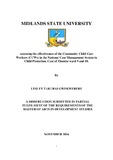Please use this identifier to cite or link to this item:
https://cris.library.msu.ac.zw//handle/11408/2989Full metadata record
| DC Field | Value | Language |
|---|---|---|
| dc.contributor.author | Gwekwerere, Lesley T. | - |
| dc.date.accessioned | 2018-03-12T10:11:21Z | - |
| dc.date.available | 2018-03-12T10:11:21Z | - |
| dc.date.issued | 2016 | - |
| dc.identifier.uri | http://hdl.handle.net/11408/2989 | - |
| dc.description.abstract | The study aimed at assessing the effectiveness of Community Child Care Workers in child protection case management. The study interest cropped up after realizing some diversion of the CCWs from meeting the set goals; increased frequency in unreported cases of child abuse in form of sexual, physical, psychological/neglect and emotional; unreported cases of child marriages, child labor, out of school and school dropouts as well as increased child headed households and increased prevalence in teenage HIV/AIDS cases and lastly, increased number of children out of school and children on the neglected loitering in Zhombe communal area. The study was conducted qualitatively and designed in a case study of which Zhombe ward 9 and 10 made the case in which data was generated and findings were generalized. The study had a total population sample of twenty six (24) participants, comprised of ten (10) Community Child Care Workers (CCWs), four (4) In-School Child Protection Committee members (CPCs), two (2) Ward CPCs and eight (8) representatives of various stakeholders. Data was mainly generated through fourteen(14) questionnaires selfadministered to the randomly sampled CCWs and CPCs drawn from ward 9 and 10 respectively and through face to face interviews with eight purposively chosen participants drawn from different stakeholders interested and operating in child protection issues in the two wards. Data was analyzed through SPSS v 16.0. The study found out that the major role/functions and mandate of the CCWs included: identifying cases and assessing needs of vulnerable children; Formulating Action Plan; Implementing the action plan; Recording the action implemented; Case Reviewing and track recording; Referring cases and case followups; Identifying new problems or challenges arising in the communities; Closing cases; Establish family clubs and support groups for communities. The study further found six major challenges faced by the CCWs in performing their role and mandate namely, lack of training; infrequent trainings; lack of financial motivation/incentives, cultural factors, lack of legal protection, poverty and lack of community support. The study recommends the following strategies to improve the effectiveness of the CCWs in child protection case management. The need to incentivize the CCWs either in monetary terms or non-monetary benefits; community sensitization and concretization on the importance, role of CCWs and on the scope of CCWs; authorizing CCWs to close cases and allocating more resource i.e. uniforms and identity cards and more trainings for the CCWs. | en_US |
| dc.language.iso | en | en_US |
| dc.subject | Workers | en_US |
| dc.subject | child protection | en_US |
| dc.subject | Community | en_US |
| dc.subject | Child marriages | en_US |
| dc.title | Assessing the effectiveness of the community child care workers (CCWs) in the National Case Management System in Child Protection: case of Zhombe ward 9 and 10. | en_US |
| item.grantfulltext | open | - |
| item.fulltext | With Fulltext | - |
| item.languageiso639-1 | en | - |
| Appears in Collections: | Master Of Arts In Development Studies | |
Files in This Item:
| File | Description | Size | Format | |
|---|---|---|---|---|
| Final Dissertation Draft (Gwekwerere).pdf | Full Text | 993.26 kB | Adobe PDF |  View/Open |
Page view(s)
162
checked on Apr 17, 2025
Download(s)
148
checked on Apr 17, 2025
Google ScholarTM
Check
Items in MSUIR are protected by copyright, with all rights reserved, unless otherwise indicated.



